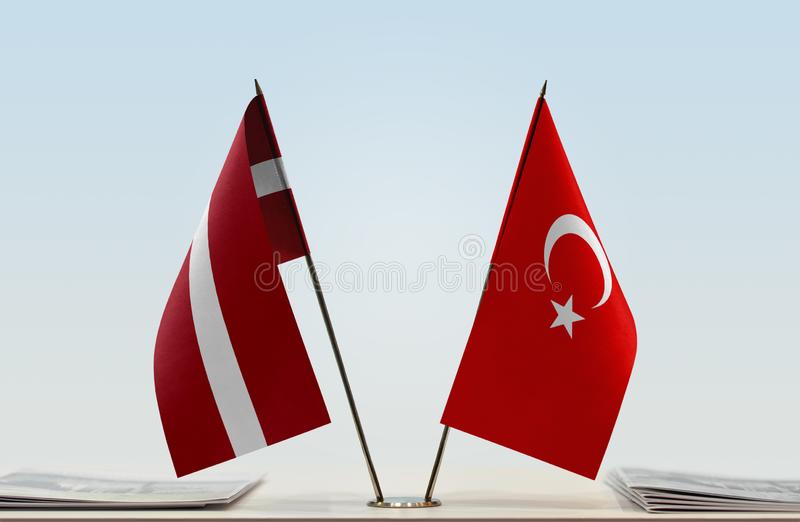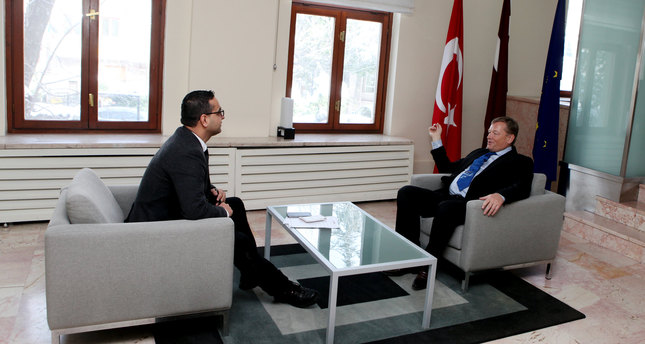12.01.2013. 12:33
During Latvia’s presidency of the EU, the 28-nation bloc will open new chapters for Turkey. Moreover, the absolute majority of the EU countries look forward to having part in the Turkey-EU relationship, said the Latvian envoy to Turkey
Latvia will hold the Presidency of the Council of the European Union in the first half of 2015. The presidency is considered by European circles as an opportunity to define and change the country’s role in the EU. As Daily Sabah we sat with Latvian Ambassador to Turkey Mr. Atis Sjanīts and talked about the priorities of Latvian presidency, the terrorist attack on Charlie Hebdo in Paris, Turkey’s EU bid and bilateral relations.
DS: Latvia will hold the Presidency of the Council of the European Union in the first half of 2015. Could you elaborate on the priorities of the Latvian Presidency please?We have three groups of priorities: First, competitiveness in growth. It was a priority for previous Italian and Luxembourg Presidencies though. It’s the most important item on the agenda of the European Union because as you know, Eurozone has a low rate of growth. No more than 1 percent is expected for this year. Turkey on the other hand, is very dynamic with its 3 percent annual growth and might be an example for us. What needs to be done for us is to increase competitiveness in Europe and to complete the single market. Another issue is energy. We are thinking about an energy union by dealing with it not only on the national but also the international level.
The second priority is digital Europe, within a common telecommunication market and data protection. And most important of all, the third priority is to attain a more engaged Europe. It is important for us because we are speaking about our direct neighbors, and these are the Eastern partnership countries. The main event during our six-month presidency will be the Eastern Partnership Countries Summit on May 21-22 in Riga. Countries in this partnership have the same importance for us, and they have the same importance for your country as well. Those are Azerbaijan, Armenia and Georgia in the Caucasus and Ukraine in Europe, which is a direct neighbor, and Moldova as one of the important countries for Turkish foreign policy, and there is also Belarus. I hope candidate countries to the EU will also be invited to the summit so decisions are taken by the whole union, including Turkey.
The main subject here is to strengthen the ties between the EU and those countries in the Eastern Partnership. While some of them would like to have a European perspective like Ukraine, Moldova and Georgia, also Azerbaijan and Armenia would like to have closer relations with the EU. That’s understandable as our priority is that not only are they our neighbors, but we have lived together in a … space since the Soviet era. The same also applies for Central Asian countries that are seen as one of our priorities during our presidency. We would like to remove the strategy of the EU toward Central Asian countries that we regard as one of the priorities in Latvian foreign policy. We would like to have a strong relationship with them for the European Union as well. Those counties are also important for Turkey as a space to work on these issues. DS: Latvia has always been supportive on Turkey’s EU bid. Shall we expect to open new negotiation chapters during the Latvian Presidency? We will open new chapters because I may reassure you that the absolute majority of EU countries would like to have dynamics in the Turkey-EU relationship. There is forward momentum, which means that there are new chapters to open. There is talk about several chapters, and EU Commissioner Hahn also affirmed during his visit to Ankara that he will do his best to open new chapters in Latvia’s presidency, and he repeated the same in Riga. Today, the whole commission is in Riga and held a meeting with the Latvian government to discuss the priorities in Latvia’s presidency. It is not only related to the Latvian position but the other 27 members agreeing on that. However, an absolute majority of countries are very keenly interested in maintaining these dynamics.
Despite some problems that exist for some countries, an absolute majority thinks that a supposedly frozen relationship with Turkey is out of the EU’s interest. Also one of the issues that we are good at is the visa liberalization issue, and further progress will be witnessed in our presidency term. We will try as fast as possible to eliminate the bureaucratic hurdles. Again it is something very practical, and I would be very happy if we do not have bureaucratic procedures in our embassy for Turkish citizens. In our embassy we do not have many applicants, and it is easier to get a visa here, but bureaucratic procedurals are not pleasant for each person, and those should be eliminated. DS: Turkey and Latvia are also members of NATO. What are the main areas of cooperation between the two countries within the scope of NATO? Turkey has a strong voice in NATO and from time to time it patrols Latvia and Baltic countries’ airspace. Therefore, we are thankful to Turkey for doing that. This is the major project within NATO.
DS: Regarding academic debate on the political atmosphere and the function of NATO in Eastern Europe after the Ukraine crisis, how would you evaluate claims that the Iron Curtain is coming back? Actually for small countries, as Latvia is taking our history not many people would know that this year marks not only our presidency but 90 years of our relationship. Fifty years of it was under Soviet occupation, and accordingly, people did not know much about Latvia. Considering this history, international organizations, such as NATO or the EU, are really important for us. Therefore, we very much insist on not only being members of these organizations but also that they function properly, including stability and solidarity between member countries. That’s why we are trying to be a reliable member of these organizations. These do not depend on events in Ukraine or anywhere else. Having a big neighbor causes you to become cautious and to consider your security. This security, of course, can only be assured by international relations.
DS: Trade volume between our countries is slightly less than $ 0.5 billion. What are your thoughts and plans regarding establishing further economic relations?
That’s a reasonable figure for a country with a population of 2 million. We are not a big country. There are possibilities to develop, of course. We have signed the protocol of the JETCO Agreement (Joint Economic and Trade Commission) during the presidential visit of Latvia last spring. We are planning for it to come together in the next few months. It will give a boost to reciprocal trade, and the largest company in Latvia is also presented in Turkey. This company produces wood as the largest export product of Latvia thanks to forests that cover half of Latvian territory.
Pharmacy is another area for trade. Also livestock products are another area for Latvia to export because our country is very green, and it is possible to produce milk and meat. Turkey is a great market for us and for everybody. I should also point out that three official presidential visits between the two countries happened in the last two years. Those visits happened in both directions, and this was an unprecedented level for the 90th year of bilateral relations.


Comment (0)